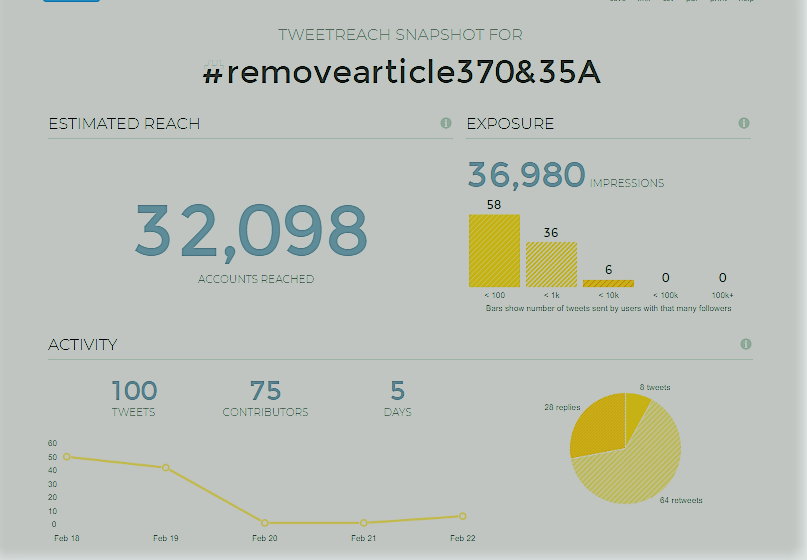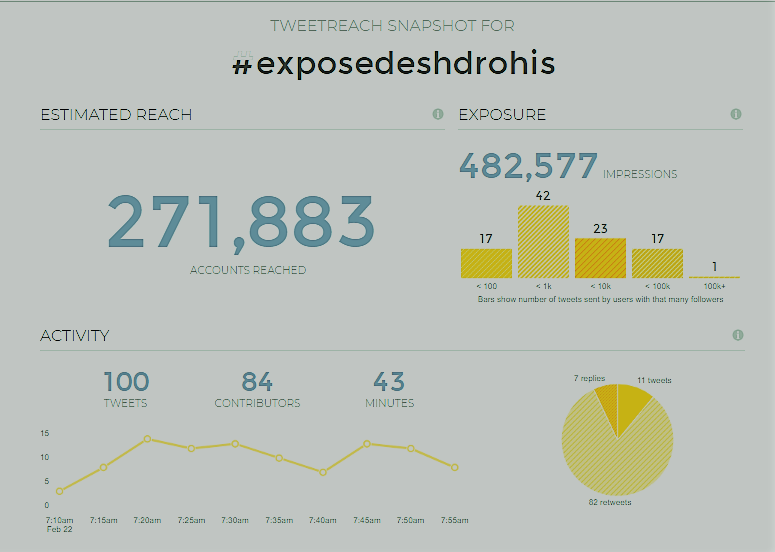On 14th February 2019, when the rest of the world was tweeting using hashtags like #TrueLoveDay and #HappyValentinesDay2019, in India, those hashtags were quickly replaced by #Pulwama, #CRPF, #PulwamaTerrorAttack, #KashmirTerrorAttack etc. This was evoked by the dastardly attack on CRPF in Pulwama, Kashmir.
Twitteratis expressed anger, pain, solidarity and discontent with the current government’s dealing of unrest in Kashmir. The conversation quickly shifted to a call for revenge against Kashmiri Muslims and Pakistan. This continued for many days after the attack and is still being used by various political parties to draw mileage ahead of the 2019 elections.
It is no secret that a trending hashtag works like another form of advertisement to draw attention and direct the course of online conversations to plug in propaganda under the garb of information to unassuming minds. While Twitter and other social media platforms flooded with condolences and solidarity, a huge section of the social community indulged in tweeting polarising messages manifesting a typical state of opportunism.
The tweets below show the opportunism that a big section of the social community indulged to propagate hate and polarisation:
Now the world will stand together against terrorism and Pakistan. Pakistan's map should not be vanished but included in India's map. Pakistan be ready for the Payback.#StandWithForces #KashmirTerrorAttack #Pulwama pic.twitter.com/bDBh5IqviB
— Chandrayan Chakraborty (@Chandrayan4435) February 15, 2019
#KashmirTerrorAttack – Better to treat Cancer in the preliminary stage @adgpi @rajnathsingh @AkashSh22791790 @crpfindia @AadityaPaathak @AkashSh22791790 pic.twitter.com/1seisLPbVN
— Arvind Verma (@arvindllb16) February 20, 2019
https://twitter.com/UselessLadki/status/1097562296614678530
Need of current scenario #Pulwama #PakistanNahiSudhrega pic.twitter.com/f2tx3HQXlG
— Naman jain (@msdhoni00000007) February 14, 2019
https://twitter.com/raghvendradhoot/status/1097050968611381248
https://twitter.com/AdiShankaraa/status/996724422672187392
Kashmir is of India but kashmiris are not Indian. JAI HIND#PulwamaEncounter #PulwamaTerrorAttacks #PulwamaAttack #BadlaKab #RemoveArticle370 #RemoveArticle370and35A #BoycottPak #boycottsidhu #KashmiriMuslims go back to Pakistan#pornistan#porkistan pic.twitter.com/I8KsvM0kkX
— Jai Hind (@Jai_Soldiers) February 18, 2019
Hashtags such as #RemoveArticle370&35A, #KashmiriMuslims #ExposeDeshdrohis continued for a long time long following the attack. Even seemingly neutral hashtags like #KashmiriMuslims were used to manufacture sentiments of hate.
However, a sliver of sanity came through when a small but decent number of social media users urged everyone to remain sensitive and not instigate violence through irresponsible tweets. Some of them even opened their homes and arms inviting Kashmiri Muslims with inside their homes.
That is the diversity in social media. While there are polarising opinions on a grim situation, there is also a sane section of the society that is passionate about maintaining peace and sensitivity to the political complexity that the situation demands.
The polarising opinions and call outs exemplified a typical case of “us v/s them”. It only resulted in spreading hysteria among the public to garner jingoistic reactions. Trending hashtags, when used for spreading hate, become a dangerous trend in itself as social platforms are accessible for people to express their opinion. Political parties especially the ones in power have been using this tool to alter the conversations as they want it to be, shifting the focus from the unanswered questions that exist otherwise.
Consumption Rates of Trending Hashtags
 Image Courtesy: Tweetreach
Image Courtesy: Tweetreach
 Image Courtesy: Tweetreach
Image Courtesy: Tweetreach
Political parties, especially the ones in power have been using this tool to alter the conversations as they want it to be, shifting the focus from the unanswered questions that exist otherwise. For instance, the handle that posted the below tweet is followed by Narendra Modi, once again raising the question – Why does the Prime Minister follows trolls or handles propagating communal hate?
https://twitter.com/shekharchahal/status/1098135570792869889
The Machiavellian exploitation of social media platforms for propaganda serious consequences. The aftermath of the Pulwama attacks has resulted in the harassment of Kashmiris across the country and has forced many to go back home.
Read More:
Saviour Complex: Recent Cartoons from the BJP
How Facebook Tweaked Its Political Ad Transparency Tool For India




